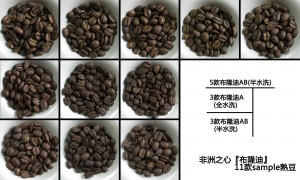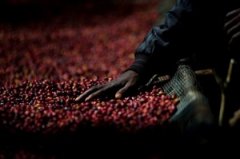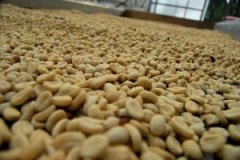African Burundian boutique coffee beans (Urundi)
Burundian coffee

Burundian coffee bears a striking resemblance to neighboring Rwanda, where coffee from the two countries is often confused. Burundian coffee is mainly grown in bourbon, with traditional wet processing of coffee cherries. Its boutique coffee is characterized by elegant sweetness and bright citrus aromas.
Place of origin:
Burundi is a small landlocked country located at the junction of eastern and central Africa, across the Nile and Congo basins, dominated by hills and mountains, with excellent coffee-growing elevations. The history of coffee cultivation in Burundi is not long, its coffee planting industry is carried out entirely in the form of small family farms, there is a great difference in quality, and years of war and social unrest have made its coffee planting industry very chaotic. But I have to admit that it has the potential to produce high-quality coffee.
Geographical environment at altitude:
Burundi is located in central Africa with a pleasant climate. Arabica coffee beans grown in the mountains of north-central Africa are of high quality and have won first prize and sixth place respectively in the coffee quality rating of Southeast African countries and the Paris Coffee Fair. According to the annual production of coffee beans in this country, the annual output is between 8000 and 35,000 tons, which is mainly sold to the European markets of Switzerland, France, Germany, Italy, Belgium, Austria and so on.
Burundi (formerly known as Urundi) has the most diverse and successful coffee industry in the world and has its own characteristics.
Burundian coffee was introduced by Belgian colonists in 1930 and is now grown only on small farms. Unfortunately, many of these farms are on the border with war-torn Rwanda, putting pressure on coffee production. Almost all coffee produced in Burundi is Arabian coffee beans, while coffee trees in Ngozi are planted at an altitude of more than 1200 meters. Burundian coffee has a rich aroma and excellent acidity, and most of its products are exported to the United States, Germany, Finland and Japan.
Coffee features:
1. It is planted by using the regional advantage of Central Africa, without adding any mixed beans and secondary beans.
two。 Baked with all-natural Arabica coffee beans
3. Its fragrance is so rich that it can be smelled without opening the package, and the room is full of fragrance when cooking.
Coffee information:
Starbucks has its eye on Burundian coffee
Starbucks of the United States, the world's largest coffee retailer, said a few days ago that it would buy more coffee from Burundi. Industry insiders said that Starbucks' move is conducive to the economic development of Burundi.
The East African newspaper reported on the 8th that in order to help Burundi integrate into the world coffee market as soon as possible, Starbucks has funded officials of the Burundian Coffee Management Commission to study abroad, and Starbucks executives will also visit Burundi this month to discuss cooperation with relevant parties.
Coffee is the main export industry in Burundi, and Starbucks' launch of Burundian coffee in its chain stores will increase the global visibility of Burundian coffee. It is estimated that 80 per cent of the 500000 coffee growers in Burundi will have a significant increase in income in the coming years.
In recent years, Starbucks has paid more and more attention to the African coffee industry and has begun to work with coffee growers in Tanzania, Ethiopia, Rwanda and Kenya.
Prices of Arabrica coffee from Burundi rise
On 17 February 2005, the New York Exchange, together with the Government of Burundi and coffee producers and exporters, agreed to lower the pricing index of Burundian coffee listed on the Exchange by 200 points, that is, an increase of 2 cents per pound (equivalent to an increase of 50 Burundian francs per kilogram). Subsequently, the Chairman of the New York Stock Exchange informed the Burundian Ministry of Agriculture and Animal Husbandry, the Ministry of Finance, the Ministry of Industry and Commerce and the Burundian Coffee Company. Burundian Minister of Agriculture and Animal Husbandry Pierre Ndikumagange was invited to attend the opening ceremony of the New York Exchange on April 14 in order to raise the profile of Burundian coffee in the international coffee market.
After the price of Burundian Arabrica coffee was raised, the purchase price of fresh coffee in Burundi was adjusted from 120 Burundian francs / kg to 200 Burundian francs / kg, which is excellent news for countries where coffee export earnings account for more than 80 per cent of total foreign exchange earnings. Due to the abundant coffee growing season Rain Water and good field management, coffee production in 2004-05 was significantly higher than that of last year. According to Burundian officials, this year's coffee bean production will reach 36000 tons, a six-fold increase over last year (5600 tons).
Burundi Buyendi AA,FWS
Producing country: Burundi
Grade: AA,FWS
Planting area: Buyendi
Brand name: Buyendi
Treatment method: wet treatment
Appearance: 1dcompany300grgrRAME 16-18SCR
Variety: Jackson bourbon
Note: due to ethnic separatism, the chaos of Burundian coffee has been going on for a long time, with a large number of old and new raw beans mixed together, making this coffee unsuitable for grading. This coffee is rough but mild, and has characteristics similar to Kenyan coffee. The flavor is sweet and fruity, with a slightly spicy finish.
Dry aroma (1-5): not applicable
Wet aroma (1-5): not applicable
Acidity (brightness) (1-10): not applicable
Taste (layered) (1-10): not applicable
Taste (alcohol thickness) (1-5): not applicable
Aftertaste (residue) (1-10): not applicable
Balance (1-5): not applicable
Base score (50): not applicable
Total score (maximum 100): not applicable
Strength / main attributes: medium strong / sweet, fruit flavor, spicy aftertaste.
Recommended baking degree: full city
Contrast: very similar to Kenyan coffee.
Important Notice :
前街咖啡 FrontStreet Coffee has moved to new addredd:
FrontStreet Coffee Address: 315,Donghua East Road,GuangZhou
Tel:020 38364473
- Prev

The hometown of African coffee Ethiopian boutique coffee beans
Ethiopia Coffee producing area: the full name of the Federal Democratic Republic of Ethiopia (formerly known as Abyssinia) is a country located in northeast Africa. English name: The Federal Democratic Republic of Ethiopia, Ethiopia is the country of origin and hometown of coffee. The most famous coffee beans in Ethiopia are Yega Xuefei and Harald.
- Next

Panamanian coffee, the king of coffee price ratio in Central America.
Panamanian Coffee growing Environment Panama is a small country located in the center of the American continent. The waters of the Atlantic and Pacific oceans flood its beaches. Panama is located at 9 degrees north latitude, the meeting point of the Central Mountains, where Mount Baru, one of the highest volcanoes in Central America, is located. The Baru volcano has an altitude of more than 11400 feet and the land around it is rich.
Related
- Guji coffee producing area of Guji, Ethiopia: Humbela, Shakiso, Wulaga
- What is the most expensive variety of Qiloso in BOP multi-variety group?
- How to store the coffee beans bought home?
- Why are Yemeni coffee beans so rare now?
- Ethiopian Sidamo all Red Fruit Sun Sun Santa Vini Coffee beans
- SOE is mostly sour? What does it mean? Is it a single bean? what's the difference between it and Italian blending?
- Is Italian coffee beans suitable for making hand-brewed coffee?
- How to choose coffee beans when making cold coffee? What kind of coffee beans are suitable for making cold coffee?
- Just entered the pit to make coffee, what kind of coffee beans should be chosen?
- Can only Japan buy real Blue Mountain Coffee? What are authentic Jamaican Blue Mountain coffee beans?

